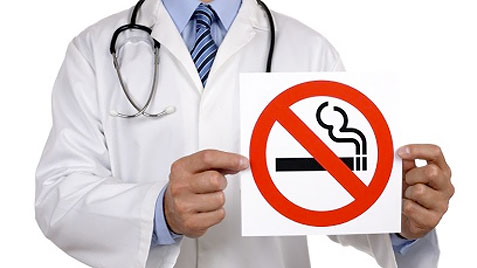 |
| Credit: www.bullz-eye.com |
New research shows
that decreased levels of vitamin D may predispose smokers to developing
tobacco-related cancer.
Cigarette smoking is the primary causal factor for at least
30% of all cancer deaths and can lead to multiple kinds of cancer, including
bladder, cervical, esophageal, head and neck, kidney, liver, lung, pancreatic,
and stomach, as well as myeloid leukemia.
Afzal et al. measured plasma vitamin D levels in blood
samples collected in 1981-1983 from 10,000 Danes from the general population.
Researchers then followed the study participants for up to 28 years through the
Danish Cancer Registry. Of the participants, 1,081 eventually developed a
tobacco-related cancer.
The authors determined that the median vitamin D
concentration among these participants was only 14.8 ng/mL, versus the higher
16.4 ng/mL median concentration found for all participants together.
These results show for the first time that the risk of
tobacco-related cancers as a group is associated with lower concentrations of
vitamin D.
The data also indicate that tobacco smoke chemicals may
influence vitamin D metabolism and function, while vitamin D may conversely
modify the carcinogenicity of tobacco smoke chemicals.
If further research confirms this, it would be consistent
with previous studies demonstrating the anti-tumorigenic effects of vitamin D
derivatives, as well as the correlation of vitamin D deficiency with favorable
cancer-forming conditions and increased susceptibility to tobacco smoke carcinogens.
This study illustrates that simple vitamin D blood tests and
supplements have the potential to improve smokers' health.
###
The above story is on the March 15, 2013 news release by American Association for Clinical Chemistry (AACC).
The research has been published online in Clinical
Chemistry, the journal of AACC:
S. Afzal, S. E. Bojesen, B. G. Nordestgaard. Low Plasma 25-Hydroxyvitamin D and Risk of
Tobacco-Related Cancer. Clin Chem,
2013; DOI: 10.1373/clinchem.2012.201939
###
a. National Cancer Institute. How To Handle Withdrawal Symptoms and Triggers When You Decide To Quit Smoking. October 2010 [accessed 2012 May 10].
October 2010 [accessed 2012 May 10].
b. National Institutes of Health. You Can Control Your Weight as You Quit Smoking. February 2010 [accessed 2012 June 13].
February 2010 [accessed 2012 June 13].
c. Centers for Disease Control and Prevention. Quitting Smoking Among Adults—United States, 2001–2010. Morbidity and Mortality Weekly Report [serial online] 2011;60(44):1513–9 [accessed 2012 May 10].
###
Quit Tips
Are you one of the more than 70% of smokers who want to
quit? Then try following this advice.
1. Don’t smoke any cigarettes. Each cigarette you smoke
damages your lungs, your blood vessels, and cells throughout your body. Even
occasional smoking is harmful.
2. Write down why you want to quit. Do you want to—
Feel in control of
your life?
Have better
health?
Set a good example
for your children?
Protect your
family from breathing other people’s smoke?
Really wanting to quit smoking is very important to how much
success you will have in quitting.
3. Know that it will take commitment and effort to quit
smoking. Nearly all smokers have some feelings of nicotine withdrawal when they
try to quit. Nicotine is addictive.a Knowing this will help you deal with
withdrawal symptoms that can occur, such as bad moods and really wanting to smoke.
There are many ways smokers quit, including using nicotine
replacement products (gum and patches) or FDA-approved, non-nicotine cessation
medications. But there is no easy way. For most people, the worst of the
symptoms only last a few days to a couple weeks.a Take quitting one day at a
time, even one minute at a time—whatever you need to succeed.
4. Get help if you want it. Smokers can receive free
resources and assistance to help them quit by calling 1-800-QUIT-NOW, or by
visiting smokefree.gov Exit Notification, SmokefreeWomen Exit Notification, SfT
(Smokefree Teen) Exit Notification, or smokefree.gov (en Español) Exit
Notification. Your doctor or dentist is also a good source of help and support.
Concerned about weight gain? It's a common concern, but not
everyone gains weight when they stop smoking.b Learn ways to help you control
your weight Exit Notification as you quit smoking.
5. Remember this good news! More than half of all adult
smokers have quit, and you can, too.c Millions of people have learned to face
life without a cigarette. Quitting smoking is the best step you can take to
help stay healthy.
Sources:
a. National Cancer Institute. How To Handle Withdrawal Symptoms and Triggers When You Decide To Quit Smoking.
b. National Institutes of Health. You Can Control Your Weight as You Quit Smoking.
c. Centers for Disease Control and Prevention. Quitting Smoking Among Adults—United States, 2001–2010. Morbidity and Mortality Weekly Report [serial online] 2011;60(44):1513–9 [accessed 2012 May 10].


No comments:
Post a Comment